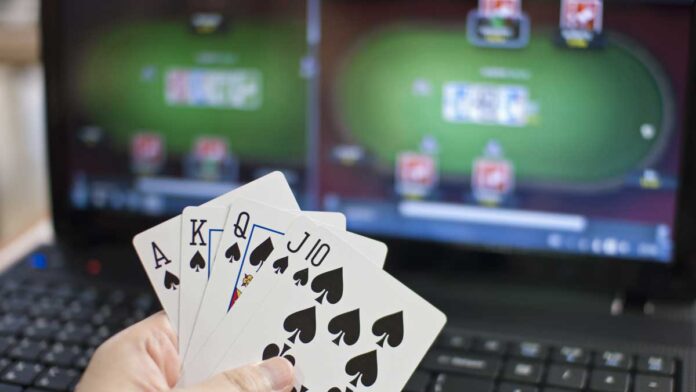In virtual poker rooms where the felt is pixelated and the faces unseen, reading your opponent becomes a game of digital detective work. Here’s how to pick up on the subtleties of online play and unravel the mysteries behind every bet and pause.
The Nuance of Bet Sizing
The bet sizing can say a lot about the players who gamble at reputable casinos like Casino999. Let’s look at some hints that can help you read your opponents.
Diving into the Chip Dialogue
In crypto poker, where the usual rustle of cards and chips is absent, bet sizing becomes the primary language of communication. It’s a nuanced dialogue that can reveal the strength of a hand, the bluff of a player, and the overall strategy of an opponent.
The Subtlety of Small Bets

What’s the language of small bets? Here are three clues.
- Conservative Clues: Like a player who speaks softly may not wish to dominate a conversation, small bets often whisper of modest hands. They are the cautious steps of a player who wants to stay in the game without risking too much.
- Draw a Map: These small stakes serve as breadcrumbs, potentially leading you to deduce an opponent’s hand. They can guide you to predict future moves and plan your strategy accordingly.
- Stay Alert: Remember that in poker, as in espionage, a whisper can sometimes be a ruse. Keep an eye out for players who may use small bets as a deceptive tactic to lure others into a false sense of security.
The Dynamics of Overbets
What does it mean if they go for overbets? Let’s clarify.
- The Sound of Confidence: Hefty bets are the bold declarations of the poker world. When a player pushes a stack that’s larger than the pot into the middle, they often send a signal loud and clear: they’ve got a hand that they’re confident can take it all.
- Assess the Board: The board’s texture is critical when interpreting overbets. A dry tableau with little potential for straights or flushes can make a large bet seem even more like a proclamation of a powerhouse hand.
- The Intimidation Factor: Overbets can also be a tool for intimidation aimed at pushing opponents out of the pot. It’s essential to consider your hand strength and confidence level when facing down these sizable wagers.
Recognizing the Plot Twists
What are the signs that the game flow is changing?
- Deviations in Bet Sizing: A sudden shift in bet sizing can be a plot twist that demands attention. An opponent who suddenly changes their betting pattern is like a character whose actions diverge from the script — it’s a moment that calls for heightened awareness and analysis.
- Contextual Cues: Understanding the context in which these changes occur is paramount. Is it a response to the action in the hand, a reaction to the stack sizes, or a strategic adjustment? The answers to these questions are often found in the broader narrative of the game and the history you’ve observed with each player.
Timing Tells in the Click of a Mouse

In the digital realm of online poker, timing becomes a beacon that illuminates the strength of a player’s hand through the speed of their actions.
Interpreting the Speed of Play
Just as a musician understands the importance of timing, a poker player must become attuned to the tempo of their opponents’ play.
- Instant Checks: When a player checks immediately, it’s like passing the conversation without a word. It’s often an involuntary admission of a hand that hasn’t connected with the board or lacks confidence in their cards.
- Snap Bets: The decisiveness of a quick bet can signal a strong hand. But remember, this can also be a rehearsed move — a continuation bet made out of routine rather than genuine strength.
- Rapid Calls: The quick call is the poker equivalent of a nod in agreement — it’s not taking the lead but is content to follow along. It can often indicate a drawing hand or a middle-strength hand that’s not ready to push the envelope but is too good to fold.
The Deliberate Dance of Deception
Conversely, the players who take their time may choreograph a dance of deception, intentionally altering their tempo to throw off your reading.
- Ponderous Checks: A player who hesitates to check might craft a narrative of strength and attempt to bait their opponent into making a move.
- Calculated Raises: When a raise is preceded by a period of contemplation, it often indicates strength. This player might be dramatizing their uncertainty, aiming to lure others into a false sense of security.
- Long Calls: The prolonged call is the poker equivalent of a thoughtful stroke of the chin — it suggests that the player mulls over a decision when, in reality, they’re often sitting on a strong hand. This deliberate pause will make opponents second-guess their next move, possibly setting them up for a future bet.
Conclusion

In the orchestration of online poker, every player contributes to the symphony with unique tells and tendencies.
To read these virtual cues is similar to conducting a complex musical piece, where every note matters and every pause has significance.
If you fine-tune your awareness of the subtleties of bet sizing and decision timing, you transform into the maestro of the online poker world, deftly guiding the game to its crescendo — your ultimate victory.








